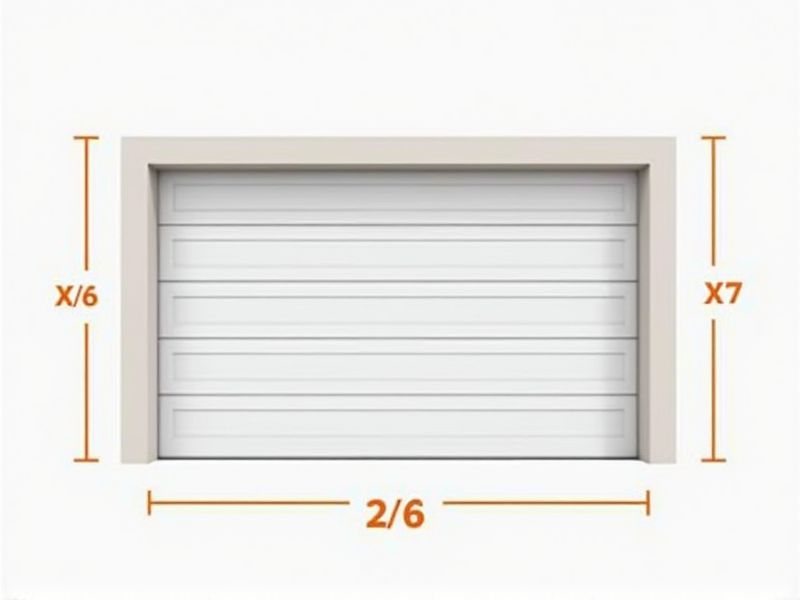
When planning for a single garage door, it's essential to know the standard dimensions to ensure a proper fit and smooth operation. Most single garage doors measure 8 to 9 feet wide and 7 to 8 feet high, accommodating a wide variety of vehicles such as cars, SUVs, and small trucks. For example, an 8x7-foot door is common in older homes, while newer homes often feature 9x7- or 9x8-foot doors to allow for larger vehicles and easier access. Knowing these measurements will help you choose the right door size for your garage, whether you're renovating or building anew.
Width: 8-9 Feet
A standard single garage door typically measures between 8 to 9 feet in width, catering to the majority of passenger vehicles. This width ensures easy access for cars, reducing the risk of scratches or dings while entering or exiting. In addition to width, the average height of a single garage door ranges between 7 to 8 feet, accommodating common vehicle types. When selecting a door, consider factors such as material, insulation, and design to enhance both functionality and curb appeal.
Height: 7-8 Feet
A standard single garage door typically measures between 7 to 8 feet in height, accommodating most vehicle types comfortably. This height allows for easier access to SUVs and trucks, ensuring you don't have to worry about clearance issues. The width for single garage doors generally ranges from 8 to 10 feet, providing ample space for entry and exit. When planning your garage space, ensure that the door height aligns with your vehicle specifications for optimal functionality.
Clearance: 10-12 Inches
A standard single garage door typically requires a clearance of 10 to 12 inches above the door to ensure proper functionality and safety. This space accommodates the door's opener mechanism and allows for smooth operation during opening and closing. Ensuring this clearance also helps prevent any potential obstructions from affecting the door's movement. For optimal performance and longevity, adhering to these clearance specifications is crucial in the installation process.
Thickness: 1.25-2 Inches
A single garage door typically has a thickness ranging from 1.25 to 2 inches, which significantly enhances its durability and insulation properties. This thickness helps provide better energy efficiency, reducing heating and cooling costs by keeping your garage's climate stable. Manufacturers often offer various materials, such as steel, fiberglass, and wood, each with its own thermal resistance ratings. As you select a door, consider the impact of thickness on overall performance, longevity, and safety for your home.
Material: Steel, Aluminum, Wood
A standard single garage door typically features three primary materials: steel, aluminum, and wood. Steel doors are favored for their durability and security, often featuring a galvanized coating for rust resistance, with insulation options that range from R-value 6 to 18. Aluminum doors, lightweight and resistant to corrosion, offer a modern aesthetic, with options for finishes that can mimic other materials. Wood doors, while appealing for their classic look, require regular maintenance to prevent weather-related damage, and typically come in designs that can be customized to match your home's architecture.
Insulation: R-Value 6.5-9
Single garage doors typically have an insulation R-value ranging from 6.5 to 9, providing effective thermal resistance and enhanced energy efficiency. This insulation level helps maintain stable indoor temperatures, reducing heating and cooling costs throughout the year. When selecting a garage door, consider that higher R-values correlate with better insulation performance, offering greater protection against external temperature fluctuations. Choosing a door with optimal insulation can improve your overall home comfort and reduce energy bills significantly.
Panel Design: Raised, Recessed
The standard design options for a single garage door primarily include raised and recessed panel designs, each providing distinct aesthetic appeal and functional benefits. Raised panels typically feature a three-dimensional look, enhancing the visual depth and character of your garage, while recessed panels offer a sleek, flat appearance that can contribute to a modern home design. Typically constructed from materials like steel or wood, these panels may come in various colors and finishes, allowing you to customize the door to complement your home's exterior. Consider the architectural style of your home when selecting between raised and recessed panels, as the right choice can significantly improve curb appeal and potentially increase property value.
Window Option: Clear, Frosted
A single garage door typically features window options that enhance both aesthetics and functionality, such as clear and frosted glass. Clear windows provide maximum light flow into the garage, offering visibility and an open feel, while frosted windows ensure privacy without sacrificing light. The choice between these options can affect your home's curb appeal, with clear glass often giving a modern look, whereas frosted glass adds a touch of elegance and sophistication. When selecting a window style, consider the impact on energy efficiency, as some glass types can help regulate temperature within the garage.
Color Availability: Limited Or Custom
A standard single garage door typically offers a range of color options, including both limited pre-finished selections and custom paint choices to meet individual preferences. Many manufacturers provide standard colors such as white, beige, and gray, while custom options can be tailored to match your home's exterior, allowing for greater design flexibility. Statistical data indicates that over 60% of homeowners opt for custom colors, enhancing curb appeal and personal expression. Selecting the right color not only improves aesthetics but can also influence property value, making it a crucial decision for any homeowner.
Automation: Compatible With Openers
A standard single garage door typically measures 7 feet in height and 8 to 9 feet in width, making it ideal for most vehicles. Automation compatibility is crucial, as many models support a variety of openers, ranging from chain-driven to belt-driven systems. Enhanced security features, like rolling code technology, ensure that your garage remains secure by constantly changing the access code. Investing in an automated single garage door not only improves accessibility but also boosts the overall value of your property.
